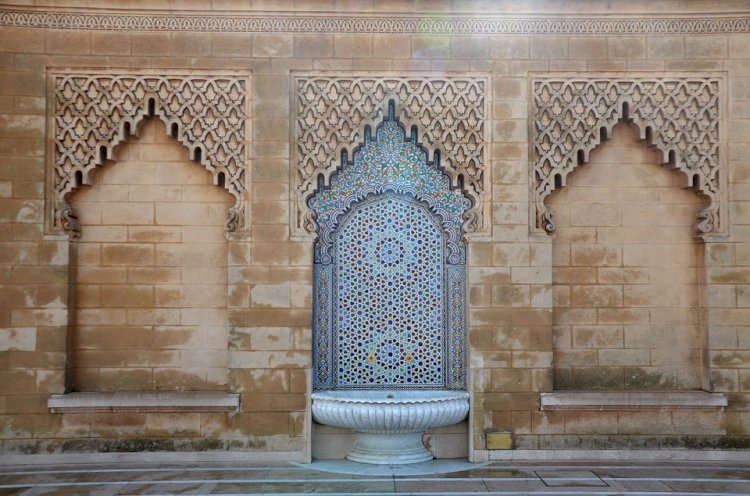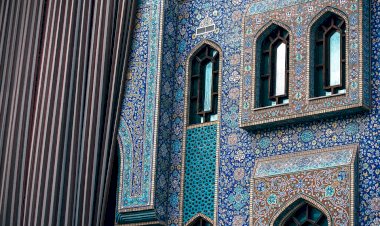Ihsān: Dimension of Soulful Excellence
As a comprehensive and successful way of life, Islam postulates three dimensions which are Īmān, Islām and Iḥsān. An impeccable mixture of these three paves the way for soulful excellence from the material matrix to the highest peak of success and salvation. Iḥsān means beautification and perfection, which is derived from the word husn that means beauty. This word recurrently appears in the holy Quran and Sunnah in a sense of positive feature of perfection that belongs to a believer (mu’min). For example, Allah says: "Allah commands justice, the doing of good (iḥsān), and generosity to kith and kin, and He forbids all shameful deeds, and injustice and rebellion: He instructs you, that ye may receive admonition." (Surah al-Naḥl-90).
Iḥsān opens out its horizon of implications to an extent that covers every aspect of human life though it seems, at a glance, little concerned. The Messenger (ﷺ) emphasized its importance: "Verily Allah has prescribed Iḥsān (perfection and excellence) in all things. So if you kill then kill well; and if you slaughter, then slaughter well. Let each one of you sharpen his blade and let him spare suffering to the animal he slaughters” ((Muslim)). Here, the Messenger (ﷺ) explained iḥsān as an all-embracing qualification that covers all walks of human life. The slaughter, however, is used purposefully that means even in matters that tend to be destructive and futile; there is a scope of application for iḥsān. Killing here means that which comes under the category of qiṣāṣ (retaliation). The very idea could be traced in yet another hadith “If you make a judgment, be just. If you have to kill, kill in the best manner. Verily, Allah Almighty is Excellent and He loves excellence” (Al-Ṭabrānī).
The Hadith of Gabriel (ḥadīth Jibrīl) apparently explains the three pillars of Islam as the prophet himself concluded that Gabriel came to teach the religion, i.e., Īmān, Islām and Iḥsān. Many scholars commented that Īmān is the first step of any Muslim to spirituality followed by Islām, which means rituals. With the Iḥsān one reaches to the peak of divine proximity. Nobody can observe Iḥsān without Islām and cannot gain Islām without Īmān. In other words, Īmān gets completed with Islām and Islām gets realized only when Iḥsān is well performed. This sequence of activities needs the body and mind of a man to be correlated and concentrated toward divine proximity which liberates him from all forms of lust and desire toward material life. This endeavour is popularly known as taṣawwuf, a refined pathway to Iḥsān.
The prophetic phrase “to worship God as though you see Him; and even if you do not see Him, surely He sees you” is crystal clear definition for Iḥsān. Obviously, for a true believer, he believes that Allah is always watching him and thus, he is very vigilant. Accordingly, the sole locomotive of his actions vests in God's sake. Surely, all human performance gets perennial perfection when it is performed for the sake of God alone.
The definition of Iḥsān itself points out two successive phases that generally the believers are oriented to. The uppermost layer is described by 'To worship God as though you see Him'. For a true believer, God is the most preferential entity, the most precious enlightenment which he wants never get lost from his consciousness. In this phase, the servant experiences the divine presence whenever he is in the service of God. To see God or enjoy His presence is one of the most cherished moments of every creature. The Holy Quran says; “On that Day some faces will be bright, looking at their Lord” (al-Qiyāmah: 21, 22). Here, the Quran explicates the joy and satisfaction of the servant when he faces God.
The bottom layer of Iḥsān is articulated in the phrase “if you don't see Him, surely He sees you”. It emphasizes on the fact that the human being is always under the surveillance of God. Moreover, every deed of a man should be deliberate, calculated and well planned with the purest intention because the whole life of a man is accountable. In one of the verses of the holy Quran, which articulates the position of man in this world, “So whoever does an atom’s weight of good will see it. And whoever does an atom’s weight of evil will see it' (al Zalzalah: 7-8). Thus, every aspect of human life should be designed resolutely towards life hereafter and the cause of God. Iḥsān, in this respect, reminds the believer of this fact throughout his life.
Apart from the surveillance of God, his concerned matters and manners, and rubrics of appraisal should also be considered. The modern science of business administration and human interactions concentrates on appearance and superficial impression methods. Islam, however, gives weight to the inner purity and chastity as it is clear from the Messenger's (ﷺ) teachings. He says; 'Verily Allah does not look to your faces and your wealth but He looks to your heart and to your deeds' (Muslim). Accordingly, what all concern is not race, caste and class of a person rather the actions and its motives. This makes a man more vigilant in his actions and interactions, and of course, he thrives to more perfection. Iḥsān, in this respect, means more than its word meaning, but sparks a thought of unending strive for divine proximity and perfection. However, many often, perfection may be inaccessible for many. Holy Quran made it clear in the verses; “Therefore fear Allah as much as you can, and listen, obey, and spend well for yourselves. And whosoever is saved from the greed of his own soul; those are the winners” (al-Thagābun:16). The picture gets more clear with another verse; it goes like; “Allah does not charge a soul except [with that within] its capacity. It will have [the consequence of] what [good] it has gained, and it will bear [the consequence of] what [evil] it has earned” (al-Baqarah:286). Iḥsān thus, neither means utopian vision nor ambiguous inhumanity, rather guidance of spiritual jubilance for the sake of God.
According to Islam, the intention behind the action either equally or more important than the action itself. Often, an activity done by different persons or done in different situations may result in different stages of rewards from Allah due to the intention or situation played behind. Evidently, the story of a woman who won the Paradise only by offering some drinking water for a thirsty stray dog, may not repeat for another who does the same action. One of the primary teachings of the Messenger (ﷺ) is in this regard “Actions are (judged) by intentions (niyyah), so each man will have what he intended” (Al-Bukhāri and Muslim). Moreover, it entails people to do their acts in harmony with their thoughts and intentions, promoting ikhlās and preventing hypocrisy (nifāq), one of the most denounced evil in Islam after kufr. Especially, in a time of professional fraudulence, this thought definitely needs great attention.
When it comes to social interactions, Iḥsān develops the concept of advice (naṣiḥah). The deeper meaning of naṣiḥah goes more than that of advice. The prophetic explanation is more than enough to reveal the idea; “The religion is naṣiḥah (advice).” We said, “To whom?” He said, “To Allah, His Book, His Messenger, and to the leaders of the Muslims and their common folk” (Muslim). Hadith scholars explained the hadith as it is the performance of duties very sincerely because nobody can advise Allah and his messenger! Naṣiḥah outlines seeking good and benefits to all in its purest form, expelling selfishness that may reside in the human mind. So, naṣiḥah to Allah means worshipping him sincerely and naṣiḥah to Quran is to trace its teachings to life. Meantime, naṣiḥah to the prophet indicates to be loyal and obeyed toward all he introduced. Naṣiḥah to the leaders and the common Muslims emphasize the need of contribution one should offer selflessly to maintain social stability and order.
To sum up, Iḥsān is one of the most cherished concepts in Islam, and the Sufi scholars have been observing it in their life and teachings. It is the destination of a true believer that could be attained only through the majestic path of Īmān and Islām. Ihsan gains more significance due to its capacity to make over the human world to a more beautiful humanitarian world.
(Sayyid Munavvar Ali Shihab is the Chairman of National Project of Darul Huda Islamic University and the President of the Kerala State Muslim Youth League. He is an influential youth leader, social activist and author. He graduated from International Islamic University Malaysia with specialization in Islamic jurisprudence)
Disclaimer
The views expressed in this article are the author’s own and do not necessarily mirror Islamonweb’s editorial stance.
























Leave A Comment